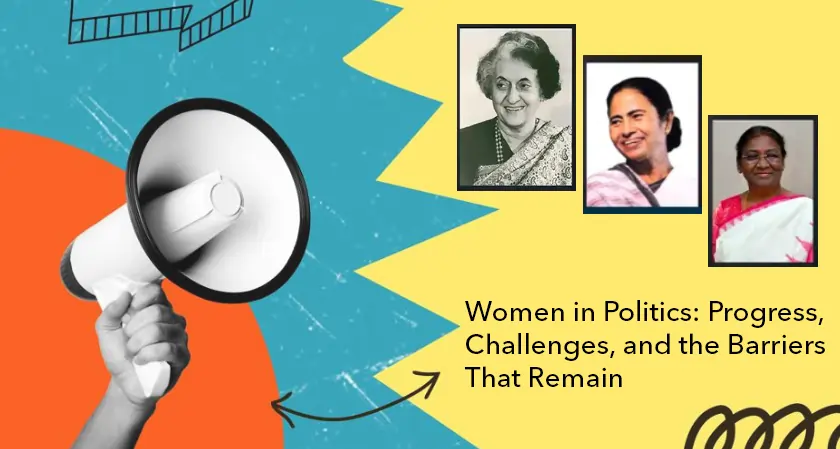Home Others Politics Women in Politics: Progress, C...
Women in Politics: Progress, Challenges, and the Barriers That Remain
Politics

Business Fortune
11 September, 2025
Women's progress in politics is seen in the fact that more women than ever before are now leaders and Members of Parliament. However, it has been observed that the journey is far from equal. Women in politics now also face many challenges, such as unfair treatment, a lack of support, and a lack of funding to run for office. Further, they also have to deal with pressure and bad comments, which men usually do not have to face. Nevertheless, there is improvement. More women are assuming leadership roles, winning elections, and proving to others that they are legitimate members of the political community. We'll examine the current state of progress, the issues that still exist, and potential solutions in this blog.
The Current Landscape
Compared to men, women make up a far smaller percentage of the political population. Only 26% of seats in parliaments around the world are held by women, according to the Inter-Parliamentary Union. Although this figure is far from equality, it is far better than the situation that was ten years ago. The disparity is much more pronounced at the highest echelons of administration, where women make up only 15% of heads of state and government.
Some nations perform significantly better than others. It has been observed that Iceland, Rwanda, and the Nordic countries have nearly equal numbers of women and men in their parliaments. However, many countries in the Middle East and North Africa have less than 10% of women in their parliaments.
Structural and Institutional Barriers
One factor contributing to the problem is that most political systems were created by men, for men. Women might thus be kept out of unofficial networks and unspoken rules. Think about how much political business is done in places like golf clubs, after-work cocktails, or old college ties, where women have historically been underrepresented or excluded.
Another major problem is money. It is costly to run for office, and women frequently find it difficult to access the same networks of funders that men do. It may be more difficult for them to raise the funds required for competitive campaigns because they may not have the same rich or business relationships. For women running for the first time, who haven't had years to cultivate donor relationships, this is particularly true.
Election administration might also have an impact. Research indicates that in systems where political parties select a list of candidates to run, women typically perform better. In systems where there is only one winner and all the contestants compete with one another, they perform worse.
Social Barriers to Women in Politics
Women in politics face expectations that men simply don't deal with. They must project a sense of strength as leaders while remaining personable and feminine. They are referred to as aggressive or unlikable if they are too rough. They are perceived as weak or ill-equipped to lead if they are too gentle. Another social barrier women face in politics is from the media.
The media often ask them about their hair, attire, and work-family balance, which they never ask of male politicians. This may draw attention away from their abilities and significant concepts. Women who are moms may find it difficult to participate in politics. They frequently have to adhere to a hectic and fluctuating schedule, travel, and work late. They find it difficult to juggle work and family obligations as a result.
Personal and Professional Obstacles
For many female politicians, the hostile environment is becoming worse rather than better. Online harassment of political women has increased dramatically in frequency and severity. Those from minority origins and women of color are frequently the ones who suffer the most. After being treated this way, some qualified women decide politics isn't worth the personal expense, while others depart. If you don't see people who are like you in a position of authority, it's likewise hard to imagine yourself in one. Fewer women ever consider running for government when there are no female mentors or role models in politics.
Progress and Solutions
Several approaches have demonstrated positive outcomes in increasing the number of women in politics. In many locations, gender quotas have been successful. Representation usually rises when nations mandate that political parties nominate a specific proportion of female candidates or set aside legislative seats for women. Although the details differ from location to location, the general trend is evident: quotas are effective.
Political parties are beginning to realize how many people support and like female candidates. According to studies, women are frequently trusted more when it comes to crucial matters like healthcare, education, and combating corruption. Parties are now seeking more women to run for office as a result. Additionally, they are supporting them by providing training and assistance so they may meet other political figures and develop their talents.
Organizations devoted to supporting women in politics have grown significantly. Women who wish to enter politics can seek assistance from organizations like Emily's List in the US and others of a similar nature worldwide. They offer guidance from seasoned mentors, assistance with fundraising, and training for managing campaigns. Some of the obstacles women have while attempting to begin a career in politics are lessened by this assistance.
The Path Forward
Gender equality in politics will require patience and consistent work in a variety of fields. Political institutions themselves must change, as must more general perceptions of political engagement and leadership. Every woman who enters politics contributes to the creation of new standards. Women show that political duties aren't gender-specific when they run for office, win elections, or assume leadership roles. Future applicants who envision themselves in comparable roles will find this visibility important.
Though unevenly, progress is still being made in various nations and political systems. The pace is partly determined by how quickly civilizations can create more hospitable political environments and eliminate any institutional barriers that may still be there. Everyone's life is affected by political decisions; therefore, democratic government as a whole benefits from increased engagement in the decision-making process.


































